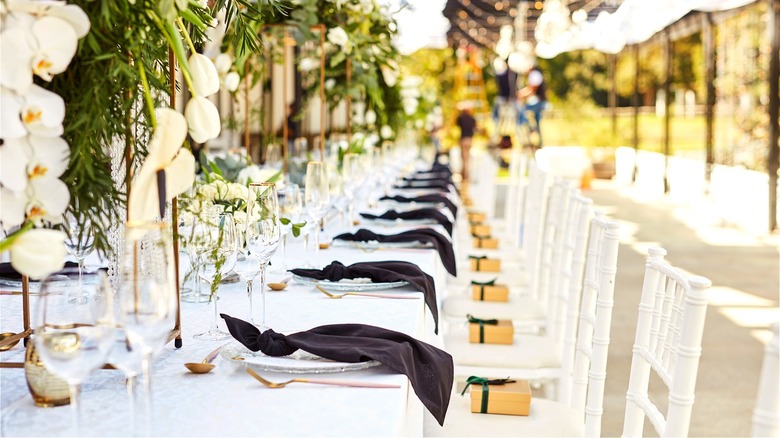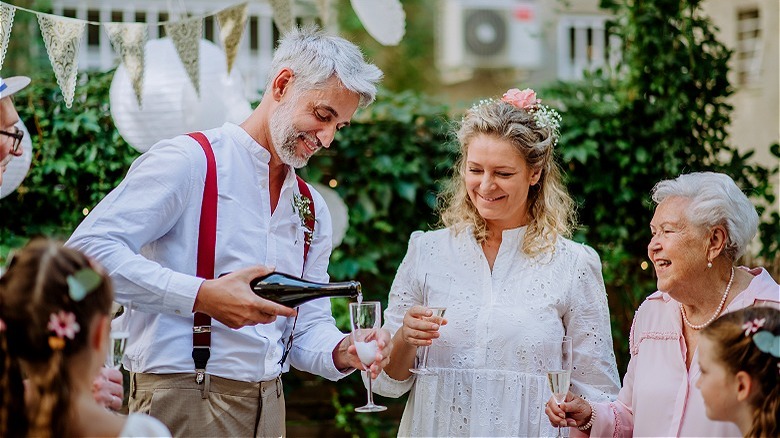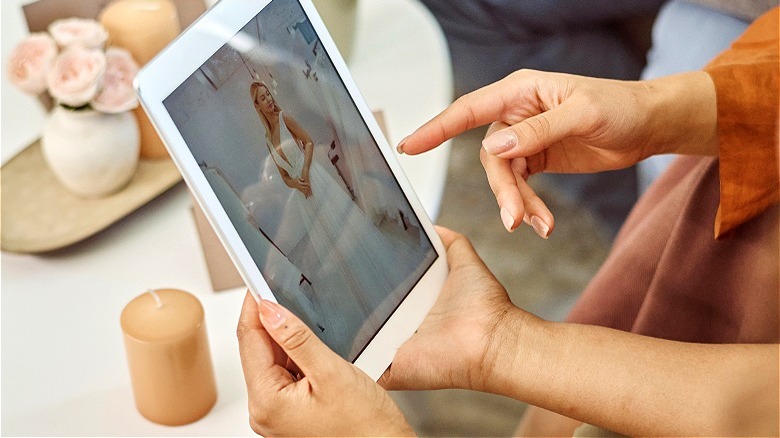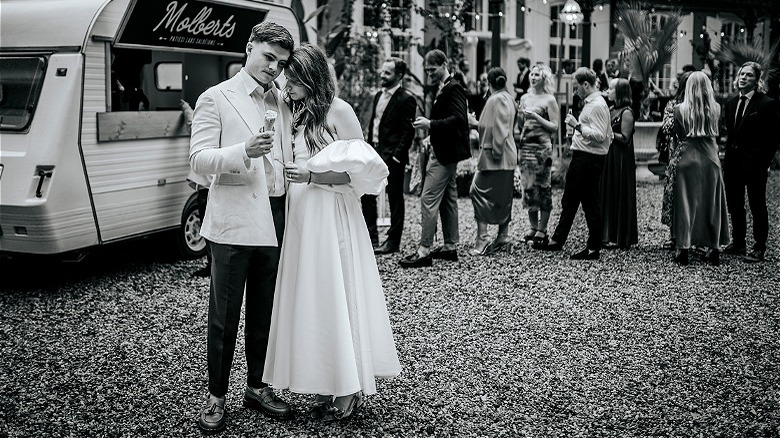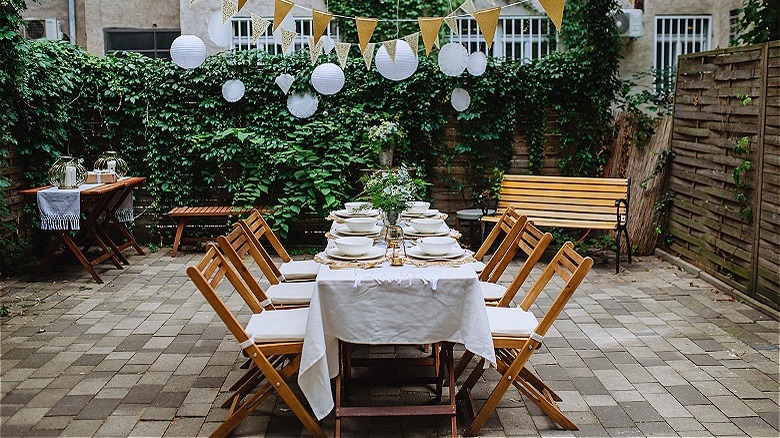Wedding Trends That Will Save You So Much Money
With wedding season officially in full stride, chances are good you have recently attended (or will soon be attending) a wedding. Between friends, cake, and dancing, weddings can be a fun occasion that, for those who might be in the middle of their own wedding planning, can also serve as a place to find inspiration and ideas. However, increasingly, finances play a big part in planning a wedding and it's easy to understand why. According to The Knot 2023 Real Weddings Study, couples spent $35,000 on average on their wedding, doling out an average of $304 per guest.
Between inflation, U.S. housing prices, and the return of student loan repayments, you might be looking at wedding expenses in disbelief. As the cost of goods and services continues to rise, many couples might find themselves instead looking for more affordable ways to celebrate their big day without going broke. As with everything budget-oriented, the most important thing to figure out before starting the planning process is what your priorities are. Finding ways to create your dream celebration while also adhering to a budget can require compromise and, above all, creativity.
Luckily, we spoke with Elisse Mills, wedding planner and owner of Our Own Table Co., about the top budget-friendly trends that couples should consider when planning their wedding. There are a lot of financial things to keep in mind when it comes to planning a wedding (plus money tips you enjoy once you're married) so let's dive into the budget-friendly wedding trends that can help you save money while celebrating.
Keep it small
While weddings seem like they get bigger every year (for instance, The Knot found that people had, on average, 115 guests in 2023), reconsidering the size of your guest list could prove to be a financial lifesaver. Said Elisse Mills, "The smaller the guest count, the more the budget can be used creatively or saved entirely!" This means that by deciding to throw a smaller event, you could end up with more money to spend on different elements of the wedding. From smaller catering expenses to a broader choice of venues, choosing to have a more intimate event can open up possibilities that, financially, might have been impossible with a larger guest count. Similarly, you could end up choosing to save that extra money for your honeymoon or even decide to use it for something else (unrelated to your wedding) entirely.
The growth of micro-weddings in the industry (weddings between 25 to 50 guests) was partially fueled by the COVID-19 pandemic when many couples couldn't gather more than a few people at any one place. However, since then, micro-weddings have continued to gain momentum, offering up new possibilities for everything from unique venues to personalized experiences. Best of all, these smaller events cut down on total wedding expenses. According to the wedding research company, Wedding Report, roughly 15% of weddings fall into the micro-wedding guest count, while 2% host less than 25 guests. Plus, according to Brides, couples can expect a micro-wedding to cost 50% or more less than a traditional wedding (the highest end of the price range sits around $10,000).
Recycle and reuse
While the temptation to feature unique flowers and décor across all elements and spaces of your wedding can be a strong one, it makes more financial sense to repurpose or even recycle items. As suggested by Elisse Mills, "For example, floral pieces can be built in a way that allows them to be moved throughout the wedding space (from ceremony, to cocktail hour, to reception). This really ensures you get more bang for your buck." Using bridesmaid bouquets as reception table décor or even taking ceremony décor into the reception area can help ensure you get more use out of every item. Along these same lines, choosing to use faux flowers, potted plants, or even dried flowers can also be a cost-cutting measure that still provides visual appeal for your wedding without the added expense or hassle of hiring a fresh florist. Similarly, some venues allow you to rent faux florals or decorations, which could also help you cut down on expenses.
An added benefit of recycling and reusing parts of your wedding is the sustainability aspect. For those who might not know, the average wedding produces over 400 pounds of waste and garbage (and over 63 tons of carbon emissions, according to Kate Harrison's "The Green Bride Guide") This has pushed some couples to prioritize low or even zero-waste weddings to combat the inherent waste present in wedding celebrations. From compostable tableware to digital invitations, there are many creative ways to save money while also helping the planet at the same time.
Shop online
A big way to save money on a single wedding item? According to wedding planner Elisse Mills, "Off-the-rack wedding gowns." While alterations, or even custom wedding dresses, have become more popular in recent years, they're also a surefire way to rack up additional wedding expenses. Indeed, the average price of a wedding dress may surprise you. This can be especially true for brides who might want a more ornate bridal salon experience, and/or to wear multiple dresses throughout the event. Mills elaborated, "I've seen an uptick with brides purchasing their wedding gowns from online retailers or off the rack rather than the traditional bridal salon experience."
Sticking to one dress, and a ready-to-wear one at that, can save quite a bit of money. (According to The Knot, couples spent an average of $2,000 on the bride's dress in 2023.) Alternatively, for brides who might not want to give up the salon experience entirely, keep in mind that retailers who started virtual stylist programs during the pandemic have continued to offer and even expand those online services.
Shopping online can also prove beneficial across other wedding categories. For instance, online invitations can save a significant amount of money on everything from stationary to design to actual postage. The Knot found that 2023 couples spent an average of $530 on their wedding invitations, so opting for a digital invite could save you money while also being more sustainable and eco-friendly. Other areas online activity could help you save on include finding DIY décor ideas, researching potential vendors, and finding budget-friendly guest favors.
Dine casual
While a multi-course sit-down meal might seem like the fancier option, getting creative with your catering selections can add a unique charm to your wedding while also saving you money. Elisse Mills explained some alternative options, "Food trucks, drop-and-go catering, or more casual dining options can save couples thousands. Think pizza, burgers, or barbeque." While this might seem too casual for some, it can also offer a lighter atmosphere while allowing you to ditch the hassle of a seating chart.
Plus, as food allergies and dietary restrictions continue to be a concern for catered events, having something like a food truck can help to ensure guests are able to enjoy dining options that work for their unique needs. Going casual with your dining can also make it more financially feasible to offer more/different options than the classic rubbery chicken so many have come to expect at weddings. For reference, The Knot found couples spent an average of $85 per guest on catering in 2023.
It's also worth mentioning that buffet-style meal presentations are growing in popularity, especially among Generation Z. Whereas only 49% of millennials used a buffet format during their wedding, 63% of Gen Z incorporated it into their festivities. The buffet boom adds a fun element to the dining experience, while also presenting a more social atmosphere than seated courses do. Gen Z was also more likely to ditch the seating chart than the millennial cohort with only 64% of Gen Z weddings using them compared to 78% of millennials.
Ditch the venue
The wedding venue is by far the biggest expense in a wedding's entire budget. The Knot found couples spent an average of $12,800 on just their reception venue in 2023, not including catering, a band/DJ, or décor expenses. This can quickly inflate a wedding budget and, much like with other trends (such as wedding size and food options), it could be worth finding a more creative and budget- friendly alternative. Elisse Mills suggested an old favorite, "Backyard gatherings." As with throwing a smaller gathering, ditching the more artificial feeling of a wedding venue can ultimately create a more specialized, intimate environment for your wedding.
Explained Mills, "Couples are opting out of traditional wedding venues and having smaller, more intimate gatherings at meaningful locations such as a family home or family vacation home." From family homes to national parks to public squares, finding a space with sentimental meaning for a couple can offer a fundamentally different experience than a generic (and expensive) wedding venue can. By opening up your venue possibilities, you can also get more creative with everything from the ceremony to how you choose your reception. While hosting the ceremony and reception in the same venue has become the norm for most weddings today, splitting up the two events across two separate locations can offer unique (and potentially more affordable) customization options for couples on their big day. This can also offer more flexibility on things like the ceremony's décor, especially if you opt for an outdoor ceremony location.
